1960 – 1979
BLACK: legal events in Oregon | BLUE: legal events in the Oregon State Bar | BROWN: federal events | GREEN: hyperlinks
1960s Americans increasingly demand that state and national governments adopt legislation dealing with the environment, employment, civil rights, abortion, sexual harassment, disability discrimination, workplace safety, and consumer protection. Not only do these measures foster the need for more lawyers, but they launch new specialties in, and lead to the increasing diversification of, the legal profession.
1960 Mercedes Deiz becomes the first Black woman admitted to the Oregon State Bar.
1961 The American National Standard Institute publishes the American Standard Specifications for Making Buildings Accessible to, and Usable by, the Physically Handicapped, establishing the basis for subsequent architectural access codes that will enhance the lives of individuals with disabilities. Oregon attorneys will use these codes to argue and advocate for accessibility within the workplace and in public spaces.
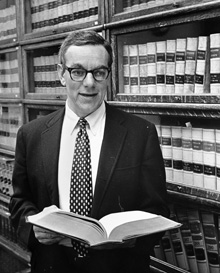
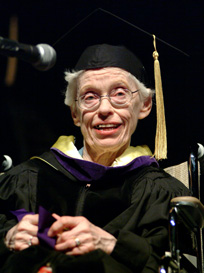
1961 Jean Lewis is appointed by Governor Mark Hatfield as circuit judge for domestic relations, becoming Oregon’s first woman circuit court judge, serving on the Multnomah County Circuit Court.
1961 Labor lawyer Sidney Lezak, a Jewish attorney and active Oregon State Bar leader, is appointed United States Attorney for Oregon by President John Kennedy. Through six presidencies (1961-82), Lezak advocates for treaty rights for Oregon tribes and helps lead Oregon through the turbulent civil rights era of the 1960s.
1963 Alice Plymell joins the Oregon State Bar as the first female member with a visible disability. She subsequently establishes a scholarship for law students with disabilities.

1963 Federal Equal Pay Act requires equal pay for men and women doing the same work.
1964 Title VI of the Civil Rights Act of 1964 is passed, prohibiting discrimination on the basis of race, color, and national origin in programs and activities receiving federal financial assistance. Title VII of the Civil Rights Act of 1964 bars employment discrimination by private employers, employment agencies, and unions based on race, gender, and other grounds. To enforce the law, the Equal Employment Opportunity Commission is created.
1965 President Lyndon B. Johnson signs Executive Order 11246 on September 24, 1965, establishing requirements for non-discriminatory practices in hiring and employment on the part of U.S. government contractors. The order prohibits federal contractors and federally assisted construction contractors and subcontractors, who do over $10,000 in government business in one year, from discriminating in employment decisions on the basis of race, color, religion, sex, or national origin. It also requires contractors to “take affirmative action to ensure that applicants are employed, and that employees are treated during employment, without regard to their race, color, religion, sex or national origin.”
1965 The civil rights acts passed during the Johnson era close a century of Jim Crow laws, which were racial segregation laws enacted between 1876 and 1965 at state and local levels mandating “separate but equal” status for African Americans, including segregation in all public facilities in Southern states of the former Confederacy. Such separation in practice led to conditions for Blacks that were measurably inferior to those provided for White Americans, systematizing nationwide economic, educational, and social disadvantages, including patterns of segregation in housing, bank lending practices, job discrimination, and discriminatory union practices.
1965 Congress passes the Voting Rights Act of 1965, prohibiting any “voting qualification or prerequisite to voting, or standard, practice, or procedure ... to deny or abridge the right of any citizen of the United States to vote on account of race or color.” The act outlaws requiring a literacy tests in order to register to vote, a principal means by which Southern states had prevented Blacks from exercising their rights. Several Oregon attorneys travel to the South to help newly enfranchised Blacks register to vote.
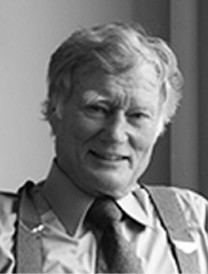
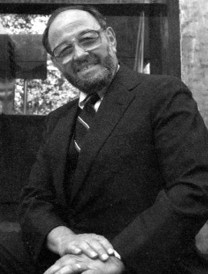
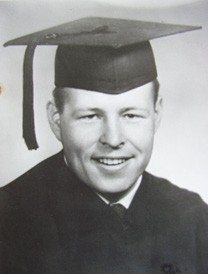
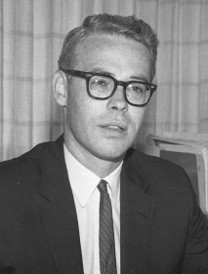
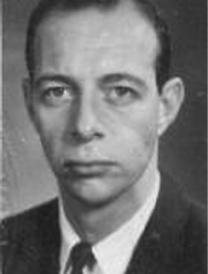
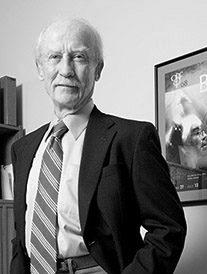
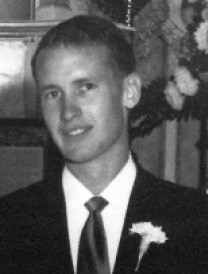
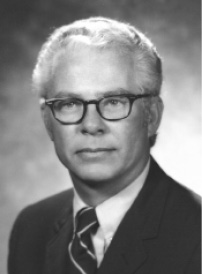
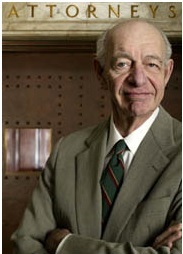
1965 At considerable personal risk, 25 members of the Oregon State Bar volunteer to go to the South to provide legal services for people who were being denied their civil rights. These attorneys will subsequently be honored by the American Civil Liberties Union of Oregon with its E.B. MacNaughton Award. The “Oregon Chapter of the Honorary Mississippi Bar Alumni” includes: Larry Aschenbrenner, Frank Bauman, Carl Brophy, Kevin Carey, Cliff Carlsen, John Dellenbach, William H. Ferguson, Robert Gygi, John Haugh, Elliot Holden, Pat Hurley, Bernard Jolles, Herbert Lombard, Jr., Don Marmaduke, William C. Martin, Bonnie Mentzer, Charles Merten, Carl Neil, Joe Richards, Roger Rook, Leslie Swanson, Jr., Jacob Tanzer, William Tobin, Jr., Glenn Walker, and Donald R. Wilson.
See the 2014 interview of Justice Jacob Tanzer discussing his work as a civil rights attorney in the South: click here for video interview.
1967 President Lyndon B. Johnson issues Presidential Executive Order 11375 expanding the affirmative action policies of 1965 to cover discrimination based on gender. Federal agencies and contractors must now take active measures to ensure that women, as well as minorities, have the same employment and educational opportunities as men, helping to open law schools and legal opportunities to more women.
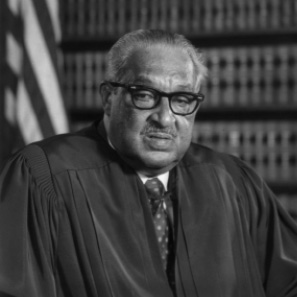
1967 Thurgood Marshall is appointed the first Black on the United States Supreme Court, helping change the face of the American judicial system. Prior to his appointment, Marshall served as the first Black Solicitor General from 1965 to 1967.
1967 In Loving v. Virginia, 388 US 1 (1967), the Supreme Court invalidates laws prohibiting interracial marriage in a case brought by Mildred Loving, a Black woman, and Richard Loving, a White man, who had been sentenced to a year in prison in Virginia for marrying each other. Their marriage violated the state’s anti-miscegenation statute, which prohibited marriage between people classified as “White” and people classified as “colored.” The Supreme Court’s unanimous decision held this prohibition was unconstitutional, ending all race-based legal restrictions on marriage in the United States.
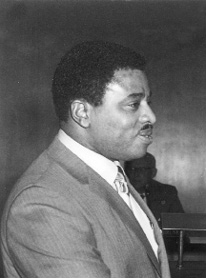
1968 President Lyndon B. Johnson signs the Civil Rights Act of 1968, which provides for equal housing opportunities regardless of race, creed, or national origin and makes it a federal crime to “by force or by threat of force, injure, intimidate, or interfere with anyone … by reason of their race, color, religion, or national origin.” The Act is signed into law during the riots resulting from the assassination of Martin Luther King, Jr.
1969 Aaron Brown, an attorney in private practice, becomes Oregon’s first Black judge when he is appointed to the Multnomah County District Court.
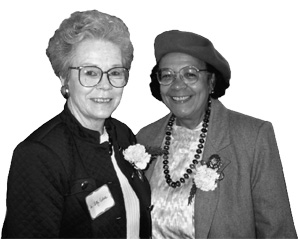
1970 Mercedes Deiz, the first woman of color admitted to the Oregon State Bar, is appointed to the Multnomah County District Court, and in 1972 is elected to the Multnomah County Circuit Court as the first woman of color to be elected judge in Oregon.
1971 The National Center for Law and the Handicapped is founded at the University of Notre Dame, Indiana, becoming the nation’s first legal advocacy center for people with disabilities.
1971 The Legal Action Center is founded in Washington, D.C., and New York City to advocate for the interests of people with alcohol or drug dependencies.
1972 Bill McCoy becomes the first African American to serve in the Oregon Legislative Assembly when he is elected to the House of Representatives. One of his first legislative actions is to introduce House Joint Resolution 13, re-ratifying the Fourteenth Amendment to the United States Constitution. The Oregon Legislative Assembly had originally ratified the amendment in 1866. However, in December 1868, Oregon withdrew its assent to the Fourteenth Amendment after opponents successfully argued that the 1866 ratification had passed only with the votes of two Grant County men improperly seated to serve in the Oregon House of Representatives. Rep. McCoy’s action did not make a legal difference since the Fourteenth Amendment had been adopted by the United States Congress over a century earlier in July 1868. But it affirmed that Oregon’s legal system now supported racial justice. McCoy’s wife, Gladys, was also active in government, becoming the first African American to serve on the Portland School Board and the Multnomah County Commission.
1972 Title IX of the Higher Education Act is passed. Renamed the Patsy Mink Equal Opportunity in Education Act in 2002, after its House co-author and sponsor (Congresswoman Patsy Mink, the first Asian-American woman elected to Congress), it states that “No person in the United States shall, on the basis of sex, be excluded from participation in, be denied the benefits of, or be subjected to discrimination under any education program or activity receiving federal financial assistance.”
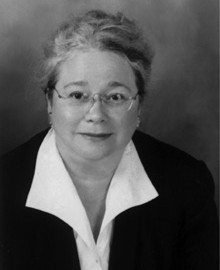
1973 The American Indian Lawyers Association is founded, ultimately becoming the Native American Bar Association. The Association subsequently develops a chapter system for state Native American bar associations, reorganizing as the National Native American Bar Association. The Association represents the interests of all populations indigenous to the lands that are now collectively the United States: American Indians, Alaska Natives, and Native Hawaiians. Oregon attorney Suzanne Ojibway Townsend serves as president of the National Native American Bar Association. By 2014, Townsend becomes a Klamath and Grand Ronde Tribal Judge.
1973 The U.S. Rehabilitation Act of 1973 is signed into law, prohibiting discrimination on the basis of disability in programs conducted by federal agencies, in programs receiving federal financial assistance, in federal employment, and in the employment practices of federal contractors.
1973 The Oregon State Bar membership approves a resolution to develop an affirmative action plan to increase the number of minorities entering law schools and passing the bar examination without “lowering academic and examination standards.”
1973 Fired from her job teaching biology for being a homosexual by the principal of a Salem-area high school, Peggy Burton takes her case to federal court, being represented by ACLU cooperating attorney Charles Hinkle. Burton is the first lesbian, gay, bisexual, or transgender (LGBT) public school teacher in the United States to file a federal civil rights suit, and the first LGBT person in Oregon to file a civil rights lawsuit of any kind. Judge Gus Solomon eventually holds that the statute the school district relied on to fire her, which allowed schools to terminate teachers for “immorality,” was unconstitutionally vague. Although she attempts to reclaim her job, the Ninth Circuit Federal Court of Appeals affirms the school district’s refusal to reinstate her.
1974 United States v. Washington, 384 F Supp 312 (WD Wash 1974), reaffirms the right of most Washington Native American tribes to act as “co-managers” of salmon (with the state) and continue to harvest it. The case, decided by Judge George Boldt, is a landmark in establishing certain economic rights of Native Americans.
1974 In Lau v. Nichols, 414 US 563 (1974), the United States Supreme Court decides that the failure of the San Francisco school system to provide English language instruction to approximately 1,800 students of Chinese ancestry who do not speak English, or to provide them with other adequate instructional procedures, denies them a meaningful opportunity to participate in the public educational program and thus violates Section 601 of the Civil Rights Act of 1964, which bans discrimination based “on the ground of race, color, or national origin,” in “any program or activity receiving federal financial assistance.”
1975 The Western Center on Law and the Handicapped is founded in Los Angeles.
1975 Velma Jeremiah becomes the first woman partner of a large law firm in Oregon, Davies, Biggs, Strayer, Stoel & Boley, now Stoel Rives.
1975 The Legislative Commission on Indian Services is created by statute to advise the Legislative Assembly and other Oregon officials and agencies on the needs of Native American people in the state.
1975 Lewis & Clark Law School creates the Academic Enhancement Program (AEP), through the efforts of the Minority Law Students Organization, to create a program to help under-represented law students get through law school and pass the bar exam. The AEP committee that evaluates applicants “look[s] beyond the numbers to find students whose life experiences, perspectives, and perseverance in overcoming challenges suggest that they would make extraordinary contributions to the law school community.”
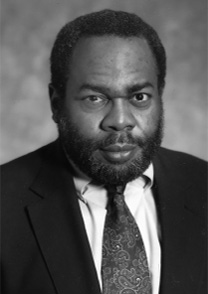
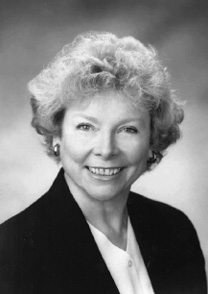
1976 The Oregon State Bar’s Civil Rights Committee continues to work on the details and scope of the Affirmative Action Program. The Bar membership formally adopts the Affirmative Action Program (AAP) and approves an annual member assessment to fund the program. There are 27 racial and ethnic minority attorneys in Oregon (.5 percent of total membership). The AAP serves only racial and ethnic minority participants. State Bar members Charles Hinkle, Clifford Freeman, and Judge H.J. Belton Hamilton are appointed to a steering committee—the Affirmative Action Committee—with Hinkle as chair, to lead the effort to implement the AAP.
1976 Norma Paulus is elected Oregon Secretary of State and the first woman attorney elected to statewide office.
1976 Responding to a nationwide effort to encourage law firms to cease alleged discrimination based on minority or marital status, or sexual orientation, the Oregon State Bar asks its members to adopt a non-discrimination policy that states: “The firm does not discriminate against any person on the basis of race, color, religion, age, sex, sexual preference, marital status, or national origin….”
1976 The Oregon State Bar’s Board of Governors appoints an Affirmative Action Steering Committee to develop an affirmative action plan for the Bar.
1976 Ronald Finley is selected as the first administrator of the Oregon State Bar’s Affirmative Action Program.
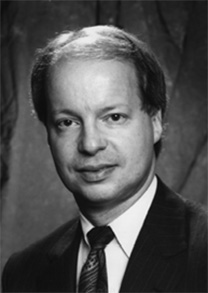
1976 Portland attorney Charles Hinkle is appointed to the Governor’s Task Force on Sexual Preference and goes on to represent gay interests in the courts and legislature as well as author reports relating to discrimination and civil rights in the work place. Forty years later, Hinkle is still recognized for his leadership in civil rights in Oregon.
1977 Oregon Advocacy Center (today Disability Rights Oregon) is established as an advocacy organization for Oregonians with disabilities. Oregon attorney Bob Joondeph, appointed in 1991 as executive director, continues to lead Disability Rights Oregon.
1977 The Willamette Valley Immigration Project opens in Portland, moving to Woodburn to protect and represent undocumented workers. It is founded in response to an increase in Immigration and Nationalization (INS) raids in Oregon. The Project provides legal advice and representation to undocumented immigrants.
1977 Oregon State Senator Betty Roberts becomes the first female member of the Oregon Court of Appeals, appointed by Governor Robert Straub.
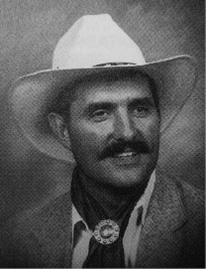

1977 The Oregon State Bar’s Affirmative Action Program assumes its initial form and dispenses funds to the three Oregon law schools for scholarships, lends money to those preparing for the bar exam, and makes grants to the schools to help support minority tutorial programs. Leslie Sorensen-Jolink becomes the second Oregon State Bar Affirmative Action Program administrator.
1978 William “Bill” Van Atta joins Leonard DuBoff as one of Oregon’s first blind attorneys. His practice includes a systematic pro bono plan based on degree of urgency. He always has at least five pro bono cases going each month, considers it a privilege to be a lawyer and to help people, noting that “I’ve been helped, so I know how much help means to people.”
1978 Click here to see electronic version of article from MCCA Diversity & the Bar magazine with Leonard DuBoff.
1978 Born in Colombia, Gregorio Perezselsky becomes one of the State Bar’s earliest Latino attorneys.

1978 Attorney Christie Helmer, the first woman partner at the firm of Miller Nash, becomes the first woman to serve on the Oregon State Bar Board of Bar Examiners.
1978 In Regents of the University of California v. Bakke, 438 US 265 (1978), the United States Supreme Court upholds affirmative action, allowing race to be one of several factors in a college admission policy. However, the court rules that specific quotas, such as the 16 out of 100 seats set aside for minority students by the University of California, Davis School of Medicine, are impermissible.
1979 75,000 people participate in the National March on Washington for Lesbian and Gay Rights in Washington, D.C. It is the largest political gathering in support of LGBT rights to date.
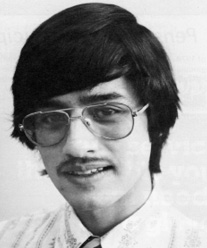
1979 Angel Lopez, a 1978 graduate of Willamette Law School and one of the first Latino members of the Oregon State Bar, is selected to administer the Bar’s Affirmative Action Program.
1979 Victor Atiyeh is sworn in as Oregon’s and America’s first Arab-American governor.
